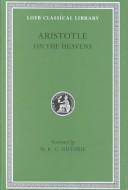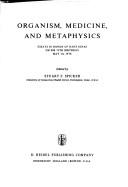| Listing 1 - 5 of 5 |
Sort by
|

ISBN: 0674993721 9780674993723 Year: 1939 Publisher: Cambridge, Mass. London Harvard University Press W. Heinemann Ltd.
Abstract | Keywords | Export | Availability | Bookmark
 Loading...
Loading...Choose an application
- Reference Manager
- EndNote
- RefWorks (Direct export to RefWorks)
"Aristotle, great Greek philosopher, researcher, reasoner, and writer, born at Stagirus in 384 B.C., was a son of a medical doctor Nicomachus and Phaestis. He studied under Plato at Athens and taught there 367-347; spent three years at the court of a former pupil Hermeias in Asia Minor and married Pythias a relation of his; after some time at Mitylene, in 343-2 he was appointed by King Philip of Macedon to be tutor of his teen-aged son Alexander, and had other students. After Philip's death in 336, Aristotle became head of his own school (of Peripatetics), the Lyceum at Athens. Because of anti-Macedonian feeling there after Alexander's death in 323, he withdrew to Chalcis in Euboea, where he died in 322. Nearly all the works he prepared for publication are lost, the priceless ones extant being lecture-materials, notes, and memoranda (some are spurious). I Practical. Nicomachean Ethics; Great Ethics (Magna Moralia); Eudemian Ethics; Politics; Economics (on the good of the family); On Virtues and Vices. II Logical: Categories; Analytics (Prior and Posterior); Interpretation; Refutations used by Sophists; Topica. III Physical: Twenty-six works (some suspect) including astronomy, generation and destruction, the senses, memory, sleep, dreams, life, facts about animals, etc. IV Metaphysics: on being as being. V Art: Rhetoric and Poetics. VI Other works including the Constitution of Athens; more works also of doubtful authorship. VII Fragments of various works such as dialogues on philosophy and literature; and of treatises on rhetoric, politics and metaphysics."--Jacket.
Astronomy, Greek. --- Logic --- Philosophy --- Philosophy, Ancient --- Rhetoric, Ancient --- Science, Ancient --- Aristotle. --- Ancient science --- Science, Primitive --- Classical languages --- Greek rhetoric --- Latin rhetoric --- Ancient philosophy --- Greek philosophy --- Philosophy, Greek --- Philosophy, Roman --- Roman philosophy --- Mental philosophy --- Argumentation --- Deduction (Logic) --- Deductive logic --- Dialectic (Logic) --- Logic, Deductive --- Greek astronomy --- Rhetoric --- Science --- Latin language --- Greek language --- Humanities --- Intellect --- Psychology --- Reasoning --- Thought and thinking --- Methodology --- Ancient rhetoric --- Astronomy, Greek --- Cosmology, Ancient --- Metaphysics --- Metaphysic --- Ancient cosmology

ISBN: 9027708231 940099785X 9400997833 9789027708236 Year: 1978 Volume: 7 Publisher: Dordrecht Reidel
Abstract | Keywords | Export | Availability | Bookmark
 Loading...
Loading...Choose an application
- Reference Manager
- EndNote
- RefWorks (Direct export to RefWorks)
This Festschrift is presented to Professor Hans Jonas on the occasion of his seventy-fifth birthday, as affirmation of the contributors' respect and admiration. As a volume in the series 'Philosophy and Medicine' the contributions not only reflect certain interests and pursuits of the scholar to whom it is dedi cated, but also serve to bring to convergence the interests of the contributors in the history of humanity and medicine, the theory of organism, medicine in the service of the patient's autonomy, and the metaphysical, i.e., phenome nological foundations of medicine. Notwithstanding the nature of such personal gifts as the authors' contributions (which, with the exception of the late Hannah Arendt's, appear here for the first time), the essays also transcend the personal and serve to elaborate specific themes and theses disclosed in the numerous writings of Hans Jonas. The editor owes a personal debt of gratitude to many, including Hannah Arendt, who offered their assistance during the preparation of the volume.
Biology --- Human medicine --- Medicine --- Metaphysics --- Biologie --- Médecine --- Métaphysique --- Philosophy --- Philosophie --- Jonas, Hans, --- Ethics, Medical. --- Metaphysics. --- Philosophy, Medical. --- -Medicine --- -Metaphysics --- -God --- Ontology --- Philosophy of mind --- Clinical sciences --- Medical profession --- Human biology --- Life sciences --- Medical sciences --- Pathology --- Physicians --- Biomass --- Life (Biology) --- Natural history --- Medical Philosophy --- Metaphysic --- Medical Ethics --- Professionalism --- Bioethics --- -Addresses, essays, lectures --- Addresses, essays, lectures --- ethics --- Jonas, Hans --- -Bibliography --- Definition (Philosophy) --- Disposition (Philosophy) --- Ontology. --- Probabilities. --- Libri amicorum --- Orations --- Philosophy of medicine --- Philosophy. --- General --- -Philosophy --- Definition (Philosophy). --- Disposition (Philosophy). --- Libri amicorum. --- Orations. --- Philosophy of medicine. --- General. --- Médecine --- Métaphysique --- -Medical Philosophy --- God --- Health Workforce --- Ethics, Medical --- Philosophy, Medical
Book
ISBN: 9782757885628 2757885626 Year: 2021 Volume: 905 Publisher: Paris Editions du Seuil
Abstract | Keywords | Export | Availability | Bookmark
 Loading...
Loading...Choose an application
- Reference Manager
- EndNote
- RefWorks (Direct export to RefWorks)
"Publié initialement en 1995, cet « esai d'autocompréhension » constitue une remarquable initiation à la pensée et à l'œuvre de Paul Ricœur. Analysant les limites du genre de l'autobiographie, Ricœur définit son projet en tant qu'autobiographie intellectuelle, en lien étroit avec le développement de son travail philosophique. L'évocation de son enfance à Rennes, sa découverte de la philosophie, ses années de captivité en Allemagne ou encore les événements à l'université de Nanterre en 1968, etc., chaque épisode est l'occasion de mettre au jour le fil conducteur d'une pensée qui s'articule autour de thématiques majeures: la question du mal et de la volonté; la place de l'autre dans le rapport au monde; l'implication du sujet dans le langage; la philosophie de l'action et sa relation au temps et au récit; et enfin la finalité de l'herméneutique qui vise à expliquer plus pour mieux comprendre."--Page 4 of cover.
Metaphysics --- Ethics --- Philosophy, French --- Egoism --- Ethical Issues --- Metaethics --- Moral Policy --- Natural Law --- Situational Ethics --- Ethical Issue --- Ethics, Situational --- Issue, Ethical --- Issues, Ethical --- Law, Natural --- Laws, Natural --- Moral Policies --- Natural Laws --- Policies, Moral --- Policy, Moral --- Censorship, Research --- Metaphysic --- Ricœur, Paul. --- Ricœur, Paul --- Lü-ko-erh --- Ricœur, P. --- Li-kʻo, Pao-lo --- ريكور، بول --- ريكور، پول --- Рикёр, Поль --- Rikër, Polʹ --- Ricœur, Jean Paul Gustave --- Deontology --- Ethics, Primitive --- Ethology --- Moral philosophy --- Morality --- Morals --- Philosophy, Moral --- Science, Moral --- Philosophy --- Values --- God --- Ontology --- Philosophy of mind --- 1 RICOEUR, PAUL --- 1 RICOEUR, PAUL Filosofie. Psychologie--RICOEUR, PAUL --- Filosofie. Psychologie--RICOEUR, PAUL
Book
ISBN: 9024715385 940102443X 9789024715381 Year: 1973 Publisher: Den Haag Nijhoff
Abstract | Keywords | Export | Availability | Bookmark
 Loading...
Loading...Choose an application
- Reference Manager
- EndNote
- RefWorks (Direct export to RefWorks)
Nietzsche, Friedrich Wilhelm, --- Heidegger, Martin, --- Jaspers, Karl, --- Anthropology. --- Metaphysics. --- Philosophy. --- Philosophical Overview --- Hedonism --- Stoicism --- Overview, Philosophical --- Overviews, Philosophical --- Philosophical Overviews --- Philosophies --- Metaphysic --- Heidegger, Martin --- Jaspers, Karl --- Nietzsche, Friedrich Wilhelm --- Anthropology --- Metaphysics --- Philosophy --- Pharmacy Philosophy --- Pharmacy Philosophies --- Philosophies, Pharmacy --- Philosophy, Pharmacy --- Nietzsche, Friedrich --- Nietzsche, Friederich --- Khaĭdegger, Martin, --- Haĭdegger, Martin, --- Hīdajar, Mārtin, --- Hai-te-ko, --- Haidegŏ, --- Chaitenger, Martinos, --- Chaitenker, Martinos, --- Chaintenger, Martin, --- Khaĭdeger, Martin, --- Hai-te-ko-erh, --- Haideger, Marṭinn, --- Heidegger, M. --- Haideger, Martin, --- Hajdeger, Martin, --- הייגדר, מרתין --- היידגר, מרטין --- היידגר, מרטין, --- 海德格尔, --- Chaintenker, Martin, --- Hāydigir, Mārtīn, --- Hīdigir, Mārtīn, --- هاىدگر, مارتين, --- هىدگر, مارتين, --- ヤスパアス, カール --- Nietzsche, Friedrich Wilhelm, - 1844-1900 --- Heidegger, Martin, - 1889-1976 --- Jaspers, Karl, - 1883-1969 --- 卡尔·雅斯贝斯
Book
ISBN: 0691196648 Year: 2016 Publisher: Princeton, NJ : Princeton University Press,
Abstract | Keywords | Export | Availability | Bookmark
 Loading...
Loading...Choose an application
- Reference Manager
- EndNote
- RefWorks (Direct export to RefWorks)
What do we mean when we say that a novel's conclusion "feels right"? How did feeling, form, and the sense of right and wrong get mixed up, during the nineteenth century, in the experience of reading a novel? Good Form argues that Victorian readers associated the feeling of narrative form-of being pulled forward to a satisfying conclusion-with inner moral experience. Reclaiming the work of a generation of Victorian "intuitionist" philosophers who insisted that true morality consisted in being able to feel or intuit the morally good, Jesse Rosenthal shows that when Victorians discussed the moral dimensions of reading novels, they were also subtly discussing the genre's formal properties.For most, Victorian moralizing is one of the period's least attractive and interesting qualities. But Good Form argues that the moral interpretation of novel experience was essential in the development of the novel form-and that this moral approach is still a fundamental, if unrecognized, part of how we understand novels. Bringing together ideas from philosophy, literary history, and narrative theory, Rosenthal shows that we cannot understand the formal principles of the novel that we have inherited from the nineteenth century without also understanding the moral principles that have come with them. Good Form helps us to understand the way Victorians read, but it also helps us to understand the way we read now.
Ethics in literature. --- English fiction --- History and criticism. --- 1800-1899 --- Analogy. --- Anecdote. --- Autobiography. --- Backstory. --- Bildungsroman. --- Cambridge University Press. --- Character (arts). --- Charles Dickens. --- Conscience. --- Consciousness. --- Crime fiction. --- Criticism. --- Critique of Pure Reason. --- D. A. Miller. --- Daniel Deronda. --- Deus ex machina. --- E. M. Forster. --- Edward Bulwer-Lytton. --- Elizabeth Gaskell. --- Epic poetry. --- Ethics. --- Eugene Aram. --- Explanation. --- Fiction. --- Franco Moretti. --- Fredric Jameson. --- Genre fiction. --- Genre. --- George Eliot. --- George Meredith. --- Good and evil. --- Groundwork of the Metaphysic of Morals. --- Gwendolen Harleth. --- Gwendolen. --- Halpern. --- Historical fiction. --- Humour. --- I Wish (manhwa). --- Ian Watt. --- Illustration. --- Intuitionism. --- Jack Sheppard. --- James Clerk Maxwell. --- John Stuart Mill. --- Johns Hopkins. --- Jonathan Wild. --- Laughter. --- Lecture. --- Leopold Zunz. --- Literary criticism. --- Literary realism. --- Literature. --- Mary Barton. --- Meditations. --- Middlemarch. --- Misery (novel). --- Morality. --- Narration. --- Narrative structure. --- Narrative. --- Newgate novel. --- Novel. --- Novelist. --- Oxford University Press. --- Parody. --- Paul Clifford. --- Phenomenon. --- Philosopher. --- Philosophy. --- Poetry. --- Political philosophy. --- Practical reason. --- Probability. --- Prose. --- Publication. --- Quantity. --- Reason. --- Ridicule. --- Roland Barthes. --- Rookwood (novel). --- Sensation novel. --- Steven Marcus. --- Subplot. --- Suggestion. --- Teleology. --- The Intuitionist. --- The Life and Opinions of Tristram Shandy, Gentleman. --- The Marriage Plot. --- The Other Hand. --- The Pickwick Papers. --- Theft. --- Theory. --- Thought. --- Usage. --- Utilitarianism. --- Victorian literature. --- William Harrison Ainsworth. --- William Whewell. --- Writer. --- Writing.
| Listing 1 - 5 of 5 |
Sort by
|

 Search
Search Feedback
Feedback About UniCat
About UniCat  Help
Help News
News